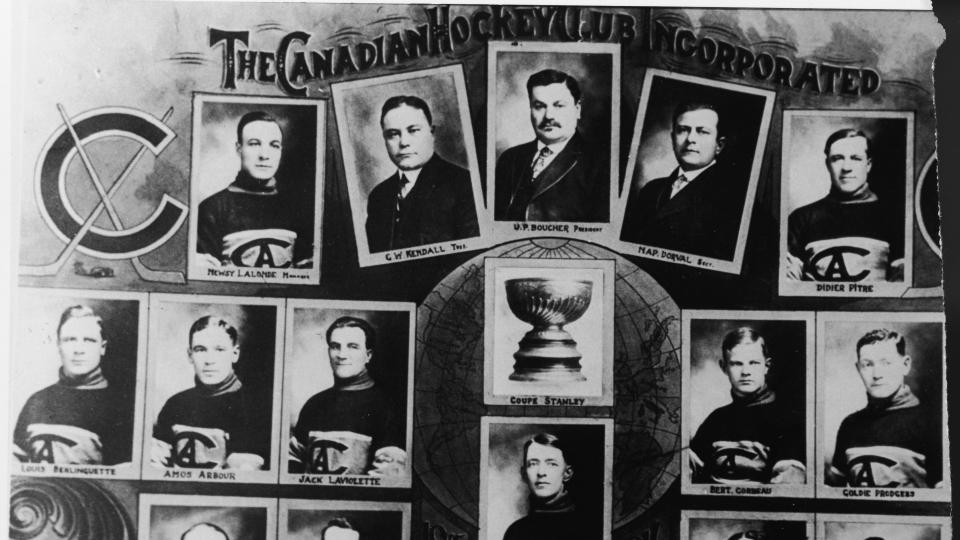Revisiting the 1919 Stanley Cup Finals affected by influenza pandemic
The coronavirus pandemic is affecting all avenues of life in a way that may be without precedent.
Nearly every major professional sports league suspended their season amid the outbreak and we all have to reconcile with what life will look like now.
It’s not without precedent, however. The 1919 Stanley Cup Finals were eventually cancelled due to the influenza pandemic and though there have been several innovations in the world of sports and of course, in medical science since the series between the Montreal Canadiens and Seattle Metropolitans, perhaps there’s something to be learned there in uncertain times.
As we navigate a world without sports, here’s what happened the last time the hockey world was profoundly affected by a pandemic.
Background

A century ago, the Stanley Cup wasn’t the exclusive property of the NHL yet. The Cup was originally formed as an open competition by Lord Stanley. By 1915, the NHL and the Pacific Coast Hockey Association (PCHA) agreed that their respective champions would face off for the Stanley Cup.
The 1919 Stanley Cup Finals was a rematch of the 1917 series, where Seattle defeated Montreal in four games in a best-of-five format. Montreal won the Cup in 1916 and the series was a matchup of the two defining powers at the time.
Montreal defeated the Ottawa Senators (no, not those Senators, the first iteration of the franchise has no ties to the modern outfit) to advance to the Cup, while Seattle beat the Vancouver Millionaires.
Before the series started, Seattle star forward Bernie Morris was arrested for dodging the draft. Morris scored 22 goals in 20 games and it was a tough blow for Seattle, as he made his fourth consecutive PCHA All-Star team in 1919.
All the games were held in Seattle, not because of the influenza, but because both parties had agreed to allow one team host the Cup as part of their arrangement - it was only in 1923 that it became commonplace for both teams to host games during the series. Montreal took the train to arrive in Seattle.
The series
Seattle annihilated Montreal in Game 1 during a 7-0 rout, as Frank Foyston notched a hat-trick while Muzz Murray (sidenote: I’ve never been enamoured with the whole ‘look at this guy’s name’ bit, but look at these names!) scored two goals.
Three days later, Montreal’s player-coach (a very real and normal thing back then) Newsy Lalonde scored four consecutive goals, carrying his team to a 4-2 victory in Game 2.
Seattle roared back with a 7-2 victory in Game 3, setting up a Game 4 for the ages. Montreal’s Georges Vezina - yes, that Vezina - and Seattle’s Hap Holmes kept the game scoreless after two overtimes, and both players left the ice to a rousing ovation.
Lalonde continued his excellent series, scoring two goals to force overtime. Jack McDonald emerged as the hero, scoring at the 15:51 mark of the first overtime to secure a 4-3 win.
Then, all hell broke loose.
Influenza strikes, leading to cancellation of Game 6
Game 6 was scheduled for April 1, three days after the Canadiens evened up the series.
In the days leading up to the game, the Canadiens became stricken by the influenza and it struck the team with alarming speed.
Lalonde, McDonald, Joe Hall, Louis Berlinguette, Billy Coutu and manager/owner George Kennedy were all bedridden as a result of the illness. Most players eventually quickly recovered but McDonald and Hall were taken to the hospital as their high fevers progressively worsened.
Health officials called off Game 6, nearly six hours before the contest was supposed to start. Unfortunately, it was too late to avoid some fatal consequences.
Kennedy tried to forfeit the series to Seattle, but Metropolitans player-manager Pete Muldoon refused to accept the title under such brutal, dire circumstances.
“Not in the history of the Stanley Cup series has the world’s hockey championship been so beset with hard luck as has this one,” the Montreal Gazette reported on April 2, following the cancellation of the series.
“The great overtime games of the series have taxed the vitality of the players to such an extent that they are in poor shape indeed to fight off such a disease as influenza. However, the Canadiens are being given the very best of care, nurses and physicians being in attendance at all times on them and every other attention is being shown the stricken players.”
The deaths of Joe Hall and George Kennedy
While the vast majority of players recovered from influenza relatively quickly, Hall’s condition only worsened at a rapid rate.
Hall died in hospital on April 5 as a result of pneumonia related to influenza.
Nicknamed “Bad Joe” Hall, the right-handed defenceman won three Stanley Cups during his career with the Kenora Thistles and Quebec Bulldogs. He won these Cups before the NHA/NHL and PCHA/Western Canada Hockey League/Western Hockey League entered their agreement to contest for the trophy.
Hall’s aggressive style of play and personality, along with his rivalry and reconciliation with Lalonde is described as such in his Hockey Hall of Fame biography.
“Hall was a rough and tumble defenseman in professional hockey's early days but at times he regretted his violent outbursts, saying once that he was ‘giving a dog a bad name.’ He played with the Stanley Cup champion Quebec Bulldogs during the 1911-12 and 1912-13 seasons and had developed a nasty feud with the Montreal Canadiens star forward Newsy Lalonde since the early days of the National Hockey Association.
“When the National Hockey League formed from the ashes of the NHA in 1917 the Quebec team took a sabbatical for financial reasons and their players were offered up to the four remaining NHL clubs through a dispersal draft. Hall's services were picked up by the Canadiens and the old adversaries, now teammates, roomed together and became the best of friends.”
Hall was inducted into the Hockey Hall of Fame in 1961.
Kennedy also died as a result of the illness two years later, on October 19, 1921. He was the second general manager in Canadiens’ history, taking over from Jack Laviolette in 1910 until his death.
He won a Stanley Cup with Montreal in 1916 and the Canadiens credit him for the first iteration of their now timeless logo.
“In 1914, Kennedy adopted a new team logo that consisted of a red ‘C’ on a blue band, with an ‘A’ inside the ‘C’, in honor of the Club Athletique Canadien, which he founded in 1908 to promote sporting events in Montreal,” Kennedy’s biography on the Canadiens’ website reads.
“During his sixth season as the team’s general manager, the Canadiens won their first Stanley Cup by defeating the Portland Rosebuds in the 1916 Final. Kennedy awarded a $238 bonus to each of his players for the championship.
“The following year, Kennedy once again changed the team’s logo to what would become the Canadiens’ trademark, replacing the ‘A’ with an ‘H’ for hockey.”
The aftermath
Kennedy’s widow, Myrtle Kendall, sold the Canadiens to Léo Dandurand, Joseph Cattarinich and Louis Letourneau for $11,500 on November 2, 1921. Dandurand served as the team’s general manager until 1935 and he, along with Cattarinich sold the Canadiens in 1935 to Ernest Savard.
Montreal would eventually recover and become one of the defining teams of the 1920’s as Howie Morenz led the Canadiens to the Stanley Cup in 1923-24. Vezina, Coutu, Joe Malone, Odie Cleghorn and Billy Bell were the holdovers from the 1919 team.
The 1919 Stanley Cup Finals remains the only time that the trophy hasn’t been awarded.
Commissioner Gary Bettman stated this week that he wants to eventually hand out the Stanley Cup this year. Although the world has come a long way in many respects in the past 101 years, perhaps we’d all be wise to exercise further caution.
More NHL coverage from Yahoo Sports

 Yahoo Sports
Yahoo Sports 


